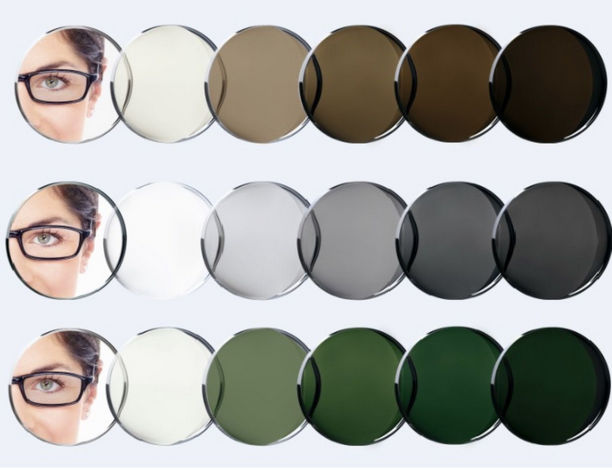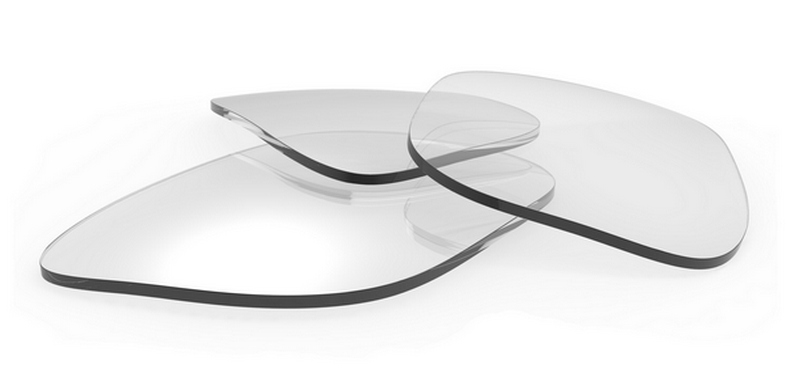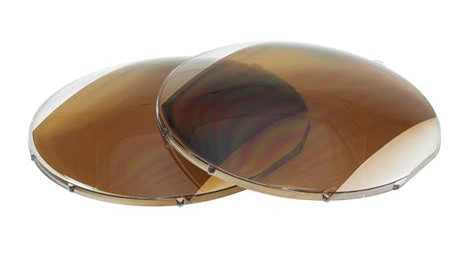- GlassesShop By FrameShop By StyleFeatured












1. Introduction
Glasses is an integral part of our daily lives, and glasses lenses material choices are crucial for comfort, visual effects and durability. When choosing glasses, there are often two common Lenses materials – plastic vs polycarbonate lenses. This article will explore the differences between the two materials in depth, helping readers better understand their characteristics in order to make informed choices.

Before discussing the two lenses materials, we first need to understand how to differentiate between them. Polycarbonate lenses are generally lighter, more impact resistant and have
higher optical quality than plastic lenses, which are more affordable and have better scratch resistance. By looking at their appearance, weight and optical properties, we can more easily
distinguish between these two lenses materials.
These are the two main advantages plastic has over polycarbonate. Poly lenses, on the other hand, protect against UV rays. Plastic does not. Polycarbonate is also more durable, lightweight and comfortable to wear than plastic.

A. Definitions and characteristics
plastic lenses are usually made of resin or plastic materials, so they are lightweight and affordable. They are highly plastic in the production process, so they can be made into lenses of
various shapes and sizes.
B. Advantages
1. Relatively low prices: Plastic lenses are often cheaper and suitable for consumers with limited budgets.
2. Strong scratch resistance: Plastic lenses has strong scratch resistance, is not easy to be scratched, so it is more durable.
3. UV radiation resistance: Most plastic lenses can be processed into an anti-UV coating that provides additional eye protection.
C. Disadvantages
1. Easy to break: Plastic lenses are relatively brittle and therefore are prone to breakage when subjected to impact or pressure and may need to be replaced more frequently.
2. relatively low optical quality: due to the characteristics of the material itself, plastic lenses may have some optical quality defects, such as aberration or distortion.

A. Definitions and characteristics
polycarbonate lenses is a new type of material with extremely high impact resistance and scratch resistance, while also having excellent optical quality.
B. Advantages
1. Strong impact resistance: polycarbonate lenses hardly break or shatter, and remain intact even when subjected to stronger impacts.
2. Higher optical quality: polycarbonate lenses have excellent optical quality, providing clearer vision with less distortion.
3. UV Radiation Resistance: Most polycarbonate lenses have a UV resistant coating that effectively blocks harmful UV rays.
1. relatively high price: due to its excellent performance, polycarbonate lenses are usually a bit more expensive than plastic lenses. 2. easily scratched: although polycarbonate lenses have
high impact resistance, they may also be scratched more easily and need to be stored and used more carefully.
2. Easy to be scratched: Although polycarbonate lenses have high impact resistance, they can also be scratched more easily and therefore need to be stored and used more carefully.
A. Consider personal needs and budget:
Choose the right lenses for yourself according to your lifestyle, vision needs and budget.
B. Consult a professional:
Seek advice from a professional glasses store to understand the characteristics of different lenses materials and applicable scenarios.
C. Try on different types of lenses:
When choosing a glasses, it is best to try on different types of lenses in person to experience their comfort and visual effects in order to make the best choice.
Choosing the glasses lenses that suit your own is key to ensuring vision protection and comfort. Whether the plastic lenses or polycarbonate lenses, there are their own advantages and disadvantages. When buying glasses, it is important to take into account prices, performance and personal needs, choose the most suitable lenses for their own, thus ensuring vision health and comfort.
Polycarbonate glasses lenses are thinner than plastic glasses. In addition, they are usually lighter and more impact-resistant than plastic glasses lenses.24 Feb 2022
Polycarbonate is 10 times more impact resistant than glass and CR-39. Polycarbonate lenses are the preferred choice for safety eyeglasses and children's eyeglasses. The lens material also provides UV protection.
If your eye prescription is high, your lenses will need to be cut thicker to correct your vision correctly. Luckily, choosing higher index lenses for your glasses means they can be thicker and still correct your vision
perfectly.
Considered a mid-index lens, polycarbonate lenses are 20% thinner than standard plastic lenses.
Although polycarbonate lenses have excellent impact resistance, they may scratch more easily than plastic lenses. Therefore, it is recommended that polycarbonate lenses be handled with care and stored properly in order to prolong their lifespan.
If you need lenses that are more impact resistant and durable, or if you have an active lifestyle, polycarbonate lenses may be better for you. If you are more concerned about cost and don't need extra protection, plastic lenses may be a better choice.

